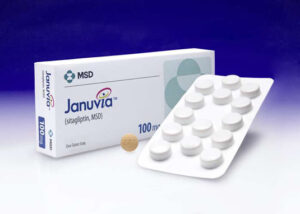Januvia, a well-known name in the realm of diabetes care, offers a pathway toward managing blood sugar levels with precision and ease. Particularly, the introduction of Januvia injections marks a significant milestone for those who may benefit from alternative administration methods beyond oral tablets. This comprehensive guide aims to shed light on the critical aspects of Januvia injections, from how they work to their dosage and side effects.
Contents
Is Januvia A Form Of Insulin?
 No, Januvia (sitagliptin) is not a form of insulin. It is classified as a dipeptidyl peptidase-4 (DPP-4) inhibitor, a type of medication that works by influencing the body’s natural production of insulin. Unlike insulin, which directly adds to the insulin levels in the body to lower blood sugar, Januvia works by enhancing the body’s ability to control blood sugar levels. It does this by inhibiting the enzyme DPP-4. This, in turn, prolongs the activity of incretin hormones.
No, Januvia (sitagliptin) is not a form of insulin. It is classified as a dipeptidyl peptidase-4 (DPP-4) inhibitor, a type of medication that works by influencing the body’s natural production of insulin. Unlike insulin, which directly adds to the insulin levels in the body to lower blood sugar, Januvia works by enhancing the body’s ability to control blood sugar levels. It does this by inhibiting the enzyme DPP-4. This, in turn, prolongs the activity of incretin hormones.
These hormones play a crucial role in the regulation of glucose by increasing insulin synthesis and release from the pancreas in response to meals and by decreasing the liver’s production of glucose. Januvia is typically prescribed as part of a comprehensive diabetes treatment plan that may also include diet, exercise, and possibly other diabetes medications.
What Are The Common Uses For Januvia?
Januvia, known by its generic name sitagliptin, is primarily available in oral tablet form, not as an injection. It is used to improve blood sugar control in adults with type 2 diabetes mellitus. The common use of Januvia involves its role as a dipeptidyl peptidase-4 (DPP-4) inhibitor, a class of medications that works by increasing the levels of incretin hormones. These hormones help increase insulin release, especially after a meal, and decrease the amount of sugar the liver makes. Thereby managing the blood sugar levels more effectively.
Since Januvia is not administered via injection, it provides a convenient option for those who may have difficulty with the insulin injections typically associated with diabetes management. It’s often prescribed as part of a comprehensive treatment plan that may include diet, exercise, and other medications. Januvia is particularly beneficial for individuals looking to manage their type 2 diabetes without the direct use of insulin. However, patients need to consult with their healthcare provider to determine the most appropriate treatment plan for their specific condition.
What Is The Dosage Recommendation of Januvia?
 The dosage recommendation for Januvia (sitagliptin) primarily hinges on the individual’s medical condition, kidney function, and any other medications they might be taking. Generally, for adults with type 2 diabetes mellitus, the standard recommended dose is:
The dosage recommendation for Januvia (sitagliptin) primarily hinges on the individual’s medical condition, kidney function, and any other medications they might be taking. Generally, for adults with type 2 diabetes mellitus, the standard recommended dose is:
- 100 mg once daily, taken with or without food. For patients with moderate to severe renal impairment or with end-stage renal disease (ESRD) requiring dialysis, the dosage recommendations are adjusted as follows:
- Moderate renal impairment (creatinine clearance 30 to 50 mL/min): The recommended dose is 50 mg once daily.
- Severe renal impairment or with ESRD requiring dialysis: The recommended dose is 25 mg once daily. Dialysis does not significantly clear sitagliptin, so the timing of the dose relative to dialysis is not important.
The dosage of Januvia must be tailored by a healthcare professional based on the patient’s individual needs and renal function. Additionally, when used in combination with other diabetes medications, such as insulin or sulfonylureas, there may be an increased risk of hypoglycemia. And the doses of these other medications may need to be lowered.
What Are The Benefits You Can Expect?
The benefits of using Januvia for managing type 2 diabetes stem from its ability to regulate blood sugar levels in a way that complements the body’s natural mechanisms. Here are some of the key benefits patients can expect from Januvia:
- Lower Risk of Hypoglycemia: Unlike some other diabetes medications that directly add insulin to the body, Januvia works by enhancing the body’s natural insulin response to high blood sugar levels. This mechanism of action tends to result in a lower risk of hypoglycemia (low blood sugar), which is a common concern with some diabetes treatments.
- Weight Neutral: Januvia is generally considered weight-neutral, meaning it is less likely to cause weight gain, a common side effect of some other diabetes medications. This can be particularly beneficial for patients who are working to manage their weight.
- Convenient Dosing: Januvia is taken once daily. It can be easier to incorporate into a daily routine compared to medications that require multiple doses throughout the day. This once-daily dosing can improve medication adherence and overall diabetes management.
- Used in Combination Therapy: Januvia can be used alone or in combination with other diabetes medications, including metformin, sulfonylureas, or insulin. Hence, allowing for flexible treatment plans tailored to individual needs.
- Cardiovascular Safety: Some studies have suggested that Januvia has a neutral impact on cardiovascular outcomes. This is an important consideration for people with type 2 diabetes, who are at increased risk for heart-related issues.
It’s important to have realistic expectations and understand that the benefits of Januvia can vary from person to person. Achieving optimal results often requires a comprehensive approach. Always discuss with your healthcare provider to determine the most appropriate treatment plan for your specific condition and health goals.
What Are The Side Effects Of Januvia?
 While Januvia (sitagliptin) is generally well-tolerated, like all medications, it can cause side effects in some individuals. The frequency and severity of these side effects can vary. But here are some of the most commonly reported ones:
While Januvia (sitagliptin) is generally well-tolerated, like all medications, it can cause side effects in some individuals. The frequency and severity of these side effects can vary. But here are some of the most commonly reported ones:
- Upper Respiratory Infections: Some patients may experience symptoms like a sore throat, nasal congestion, or a runny nose.
- Urinary Tract Infections (UTIs): Symptoms can include pain or burning upon urination, frequent urination, and cloudy or foul-smelling urine.
- Headache: A common side effect that is usually mild and temporary.
- Nasopharyngitis: Inflammation of the nose and throat, leading to symptoms similar to the common cold.
- Stomach Pain and Digestive Issues: Some individuals may experience abdominal pain, nausea, or diarrhea.
More serious, but less common side effects include:
- Pancreatitis (Inflammation of the Pancreas): Symptoms can include severe abdominal pain that may radiate to the back, nausea, vomiting, and a rapid pulse. This is a serious condition that requires immediate medical attention.
- Hypoglycemia (Low Blood Sugar Levels): Particularly when used in combination with other diabetes medications that can lower blood sugar, such as insulin or sulfonylureas. Symptoms of hypoglycemia include dizziness, sweating, confusion, and shakiness.
- Severe Joint Pain: Some patients may experience significant and disabling joint pain.
- Allergic Reactions: Although rare, some individuals may have an allergic reaction to Januvia. This can manifest as skin rashes, hives, facial swelling, and difficulty breathing.
- Bullous Pemphigoid: A rare skin condition with blistering.
It’s important to monitor for any signs of side effects and report them to a healthcare provider, especially if they persist or worsen. The benefits of Januvia in managing blood sugar levels in type 2 diabetes should be weighed against these potential risks.
Conclusion
In conclusion, Januvia (sitagliptin) offers an effective option for managing type 2 diabetes. They work to improve blood sugar control with a once-daily pill that supports the body’s natural insulin production and lowers blood sugar levels. Even without significantly increasing the risk of hypoglycemia or weight gain. While it brings the convenience of easy dosing and can be used alongside other diabetes medications, it’s important to be mindful of its potential side effects.
As always, the decision to use Januvia should be made in consultation with a healthcare provider. And, taking into account individual health needs and goals. Ultimately, this helps to ensure the best possible outcome in managing type 2 diabetes. Do you want to get rid of diabetes? Join our online diabetes treatment program and reverse Diabetes naturally through lifestyle changes such as a Personalized Diet plan, Exercise, Yoga, dieticians, and health coaches.

